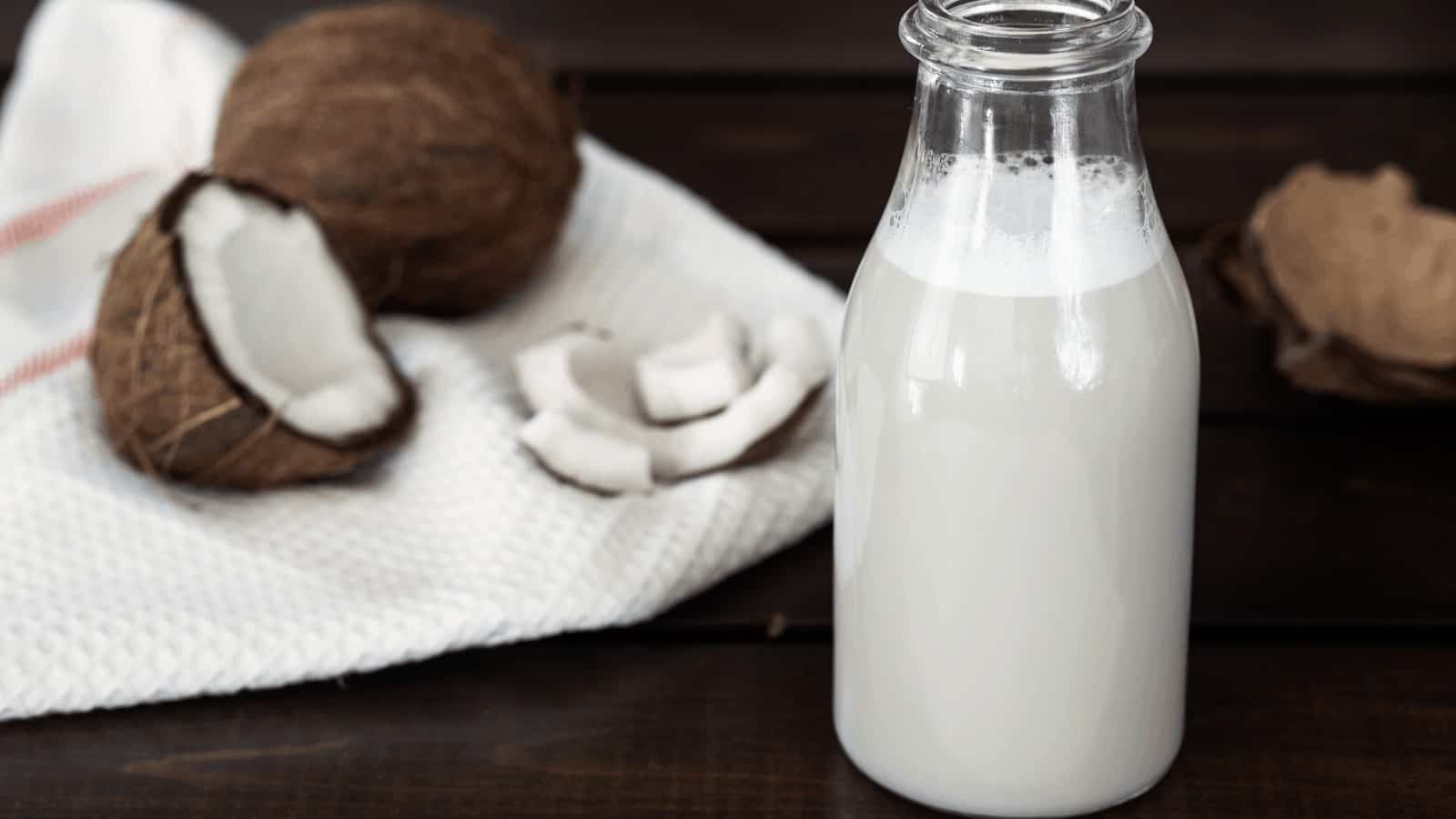Even if you’ve never had a carton of coconut milk in your refrigerator, you’ve probably tasted it without realizing it. It’s a staple in Indian-style cuisine and some other global dishes. This creamy delight lends the subtly sweet and nutty flavor of coconut that so many people adore.
Moo-ve Over, Cow’s Milk
Humans have been drinking animal milk for thousands of years. They’ve learned to process this milk into delicious products like yogurt, cheese, kefir, and ice cream through experimenting and accidents. Plus, dairy products have calcium, protein, and fortified Vitamin D & K for strong bones and teeth.
While you’re used to seeing cow’s milk and the occasional goat’s milk products, global milk consumption is more varied. Many parts of the world routinely enjoy milk and dairy products made from the milk of sheep, yaks, camels, and even horses. Goat’s milk was a viable alternative in the US for infants who couldn’t tolerate cow’s milk.
Plant-Based Alternatives
Years ago, soy milk was just about the only dairy alternative you could find in the grocery store. Today, you have a treasure trove of plant-based kinds of milk made from almonds, rice, oats, and even hemp. You’ll also notice various brands of coconut milk that you can enjoy in moderation as part of a healthy diet and lifestyle.
Whether you are interested in drinking coconut milk due to dairy intolerance or ethical reasons, it’s worth a try. It’s readily available in most supermarkets and isn’t too much more expensive than cow’s milk. Let’s see how you can get milk from a coconut.
 How Do You Milk a Coconut?
How Do You Milk a Coconut?
Of course, milk doesn’t come from coconuts or any other plant sources the way it does from mammals. However, this tasty dairy alternative does come from the fuzzy brown coconuts, as you see in the produce section. They use the white coconut meat that’s on the inside when the nut is cracked.
After the coconut meat is harvested and cleaned, manufacturers shred it and mix it with water. It soaks for a bit before they strain it and produce a delightfully creamy beverage like cow’s milk. This plant-based milk has a slightly pleasant aroma of fresh coconuts.
Many people use coconut milk for cereal and add it to their coffee or tea. It also makes rich and tasty smoothies for quick and refreshing snacks. However, there is a different ratio between the coconut meat and water for a product to use for cooking and one used for beverages. Some brands have extra sweeteners and flavorings.
Two Varieties of Coconut Milk
Not all milk made from coconuts is the same. You may find several varieties shelved with other dairy alternatives in the supermarket, like milk from almonds, rice, or soy. It’s usually sold in cartons and can vary in how processed they are or by texture.
• Beverage Type
The variety you find in cartons is ideal for mixing into smoothies or as an addition to coffee or tea. Use it as a yummy alternative to cow’s milk and enjoy it over your cold cereal or with warm oatmeal. If you choose, you can also drink it by itself as a refreshing beverage in the morning or before you go to bed.
• Cooking Type
Are you looking for coconut milk to be an ingredient for an Indian-style curry or a Thai dish? Maybe it’s a featured ingredient in a coconut-inspired dessert you’re making. For this purpose, you’ll need the variety sold in cans in the baking and spice aisle.
The beverage type in a carton is usually thin, like cow’s milk. However, the canned variety is more like a thick cream and combines better for cooking and baking. It’s sometimes called coconut cream.
What About Coconut Water?
Although milk from coconut and coconut water come from the same nut, they are different products. Dairy-free milk is processed from mature coconuts that are fuzzy and brown. Young green coconuts are naturally filled with water, making a delicious and healthy beverage.
An article written by Katie Vavrek of the Ohio State University says that coconut water is a rich source of potassium, sodium, and other essential nutrients. It’s an excellent way to stay hydrated when exercising or outside in the heat. However, coconut water can’t be used the same way you can use milk from coconuts.
Are you considering adding the milk of coconuts to your eating plan? Before you do, talk to your healthcare provider or registered dietician to see if it’s right for you. Here are seven possible benefits this dairy alternative may offer.
1. May Benefit Your Heart
Before you consider adding some milk from coconuts to your daily food plan, realize that it’s good in moderation. This plant-based milk is not low in calories or saturated fats. However, enjoying it in measured quantities may be suitable for your heart.
A study published by Dr. Ian A. Prior et al. demonstrates a possible link between consuming coconut products and a lower rate of heart disease. Prior and his colleagues studied the main diet of people from the Tokelau islands in the South Pacific. Their traditional diet includes a lot of native coconuts and products made from them.
 2. May Act as a Natural Defense Against Microbes
2. May Act as a Natural Defense Against Microbes
Coconut meat has an essential fatty acid called lauric acid when pressed into non-dairy milk. According to a study published by Dr. Miki Matsu et al. for Cell Transplantation, this compound is an effective natural antimicrobial that may fight germs and viruses that enter your body. The study states that Lauric acid may also be beneficial to your gut microbes.
3. Good Lactose-Free Alternative
Have you been diagnosed with lactose intolerance? If so, you know how the milk of cows and other mammals can wreak havoc on your digestive system. The good news is that plant-based milk from coconuts is completely lactose-free so most people can consume it without any problems.
4. May Promote Healthier Hair, Skin, and Nails
Are you tired of having a dull complexion, limp hair, and brittle nails? Maybe consuming milk from coconuts can be part of the healing solution. The essential fatty acids found in this tasty milk alternative are natural moisturizers and may help prevent premature aging.
These acids also may work as an antiseptic to reduce problems with dandruff and flaky skin. Milk of coconuts also contains Vitamin E and A, suitable for your hair, skin, and nails. Of course, this dairy alternative is only part of a healthy diet and fitness routine.
5. May Help Your Lose Weight
You probably won’t lose weight if you guzzle milk from coconuts as you would water. It does have calories and saturated fat, but it may help you lose weight if it’s part of your healthy diet in moderation. It returns to the essential fatty acids that make up this plant-based milk.
According to an article published by the American Diabetes Association, the essential fatty acids found in the milk of coconut are medium-chained ones called MCFA. The study demonstrates that these MCFAs may help reduce the chances of obesity and may lower insulin resistance.
Although this study is specific to MCFAs, more research is needed to pinpoint the milk of coconuts singularly.
6. It is Keto-Friendly
Maybe you are one of the countless people in the country who are trying to eat fewer carbs and more protein. It’s the main component of the popular keto diet, as well as other low carb eating plans. If you want a keto-friendly milk alternative, try this delicious product made from coconuts.
It’s high in some good fats, but it is low in carbohydrates. According to a Carb Manager chart, one cup of this dairy alternative has net carbs of 11.2 grams. So, you can enjoy it in moderation without worrying about consuming too many carbs in your keto diet plan. Just remember to read the label on the specific brand you buy.
7. May Help Reduce Inflammation
An article published by Harvard Medical School explains that chronic inflammation can lead to heart disease, diabetes, Crohn’s disease, arthritis, and certain forms of cancer. Sometimes, the food that you eat can affect the amount of inflammation in your body. Some foods may cause more, and some may help reduce it.
Compounds found in coconuts are naturally anti-inflammatory. They may help reduce the inflammation in your body that can lead to health problems. Of course, more research is needed for verification.
 Final Thoughts on the Benefits of Coconut Milk
Final Thoughts on the Benefits of Coconut Milk
If you are searching for plant-based milk that is as tasty as it is nutritious, you may consider milk from coconuts. It has tropical flavor nuances and possible health benefits that you can appreciate. This non-dairy milk can be part of your healthy diet, and it’s a beverage that even your kids can enjoy.


















